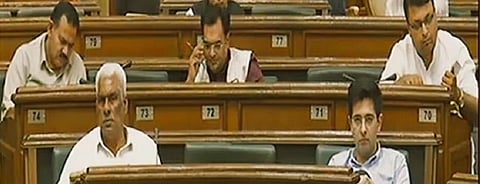

Environmental pollution again featured at the bottom of the Delhi government’s priorities as the city-state’s budget for financial year 2020-21 was passed without any discussion on March 23, 2020.
Issues such as education, health and subsidies have been taken care of in the budget. Subsidised electricity and water facilities for citizens will continue in this financial year.
In the last financial year, the revised budget was Rs 54,800 crore, while the total budget proposal was Rs 60 thousand crore. This time, the government has proposed a budget of Rs 65,000 crore for 2020-2021 but has proposed less than half per cent of the total budget (Rs 52 crore) for air quality improvement.
A sum of Rs 30 crore has been proposed in the budget to fight air pollution under the “Pollution Control and Environment Management Plan”. By this provision, smog towers will be installed in Delhi.
In fact, last year, the Supreme Court had given instructions to the government to install smog towers. At the same time, environmental experts had raised doubts on their efficacy.
A sum of Rs 2 crore has been allotted to appoint an environment marshal to prevent air pollution and implement environmental regulations. The Kejriwal government reiterated in its budget speech that its efforts had reduced air pollution by 25 per cent in the past five years.
It has set a target of reducing air pollution by two-thirds in the next five years. A provision of Rs 20 crore has been announced for an intensive awareness campaign.
The government said that it had increased the area under green cover in Delhi to 324.44 square kilometres, from 299.7 square kilometres in 2015. In 2017, the Delhi government had announced that the national capital would be made free of keekar, an invasive plant. So far, no concrete work has been done in this direction.
Only 405 Resident Welfare Associations (RWAs) out of 500 were given financial assistance for 1,690 parks throughout the year, according to the 2019 Outcome Budget. To increase green cover, the government has asked a total of 22 agencies to plant 40 lakh saplings in this financial year, but has not mentioned any kind of funds for this.
The government has reiterated the need to provide 24-hour clean drinking water to every household in Delhi within the next five years. It has also proposed 70 per cent more budget for the water supply and sanitation than the revised budget of the last financial year.
This year, 12.6 per cent of the total budget — Rs 3,724 crore — has been proposed for water supply and sanitation. However, this increased budget has been made for unauthorised colonies, sewage treatment plants and interceptor sewerage.
Apart from this, Delhi Jal Board will also treat sewage to fill water in 22 reservoirs. It has also announced to install 3,341 bulk water meters for water consumption and proper distribution across Delhi. Four decentralised water treatment plants of four million gallons per day capacity on the banks of the Yamuna will also be set up.
The Najafgarh drain that pollutes the Yamuna will be cleaned under the irrigation and flood control scheme of the budget. This project intends to increase the ground water level up to 45 kilometres from the Dhansa border to Basai Darapur Bridge.
Under it, Rs 2000 crore will be spend in the next three years to extract silt, deepen drains, build dams and parks to increase surface storage capacity. A total of Rs 410 crore will be spent in this financial year.
The demand for strengthening public transport to reduce air pollution has arisen every now and then but for the last ten years, new buses have not come onto Delhi's roads. No help was announced with regard to making Metro fares cheaper.
A total provision of Rs 4,328 crore has been made in this regard. Of this, Rs 250 crore is for the much- awaited DTC buses and Rs 1,100 crore for cluster buses.
Apart from this, a budget of just Rs 50 crore has been kept for electric buses. Rs 900 crore has been proposed to extend the fourth phase of the metro.
The Delhi government has put a total budget of Rs 7,704 crore in the health sector for this financial year. This is 13.4 per cent of the total budget. At the same time, the government has said that they will increase the number of beds to 26,000 from 10,000 by building 16 new hospitals.
The government has also made a budget provision of Rs 3 crore to fight the novel coronavirus disease (COVID-19) pandemic in this financial year. A provision of Rs 50 crore has been proposed for the next financial year.